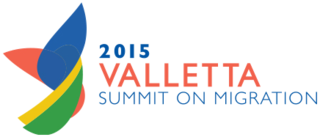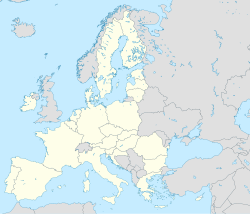Since 1945, immigration to the United Kingdom, controlled by British immigration law and to an extent by British nationality law, has been significant, in particular from the Republic of Ireland and from the former British Empire, especially India, Bangladesh, Pakistan, the Caribbean, South Africa, Nigeria, Ghana, Kenya, and Hong Kong. Since the accession of the UK to the European Communities in the 1970s and the creation of the EU in the early 1990s, immigrants relocated from member states of the European Union, exercising one of the European Union's Four Freedoms. In 2021, since Brexit came into effect, previous EU citizenship's right to newly move to and reside in the UK on a permanent basis does not apply anymore. A smaller number have come as asylum seekers seeking protection as refugees under the United Nations 1951 Refugee Convention.

The Dublin Regulation is a Regulation of the European Union that determines which EU member state is responsible for the examination of an application for asylum, submitted by persons seeking international protection under the Geneva Convention and the Qualification Directive, within the European Union.

The European Border and Coast Guard Agency, commonly known as Frontex, is an agency of the European Union headquartered in Warsaw, Poland, exercising in coordination with the border and coast guards of member states the border control of the European Schengen Area, a task within the area of freedom, security and justice domain.

The area of freedom, security and justice (AFSJ) of the European Union (EU) is a policy domain concerning home affairs and migration, justice as well as fundamental rights, developed to address the challenges posed to internal security by collateral effects of the free movement of people and goods in the absence of border controls or customs inspection throughout the Schengen Area, as well as to safeguard adherence to the common European values through ensuring that the fundamental rights of people are respected across the EU.
The European Migration Network (EMN) is an EU funded network, set up with the aim of providing up-to-date, objective, reliable and comparable information on migration and asylum for Institutions of the European Union, plus authorities and institutions of the Member States of the European Union, in order to inform policymaking. The EMN also serves to provide the wider public with such information. The EMN was established by the Council of the European Union Decision 2008/381/EC adopted on 14 May 2008.

The Directorate-General for Migration and Home Affairs is a Directorate-General of the European Commission. The role of the body is to ensure the EU's security, to build a common EU migration and asylum policy, and to promote dialogue and cooperation with non-EU countries. Thereby, it contributes to the area of freedom, security and justice (AFSJ).

The Juncker Commission was the European Commission in office from 1 November 2014 to 30 November 2019. Its president was Jean-Claude Juncker, who presided over 27 other commissioners. In July 2014, Juncker was officially elected to succeed José Manuel Barroso, who completed his second five-year term in that year.

During 2015, there was a period of significantly increased movement of refugees and migrants into Europe. 1.3 million people came to the continent to request asylum, the most in a single year since World War II. They were mostly Syrians, but also included significant numbers from Afghanistan, Nigeria, Pakistan, Iraq, Eritrea, and the Balkans. The increase in asylum seekers has been attributed to factors such as the escalation of various wars in the Middle East and ISIL's territorial and military dominance in the region due to the Arab Winter, as well as Lebanon, Jordan, and Egypt ceasing to accept Syrian asylum seekers.

The Valletta Summit on Migration, also called the Valletta Conference on Migration, was a summit held in Valletta, Malta, on 11–12 November 2015, in which European and African leaders discussed the European migrant crisis. The summit resulted in the EU setting up an Emergency Trust Fund to promote development in Africa, in return for African countries to help out in the crisis.

The European Commission's Asylum, Migration and Integration Fund is a funding programme managed by the Directorate-General for Migration and Home Affairs which promotes the efficient management of migration flows and the implementation, strengthening and development of a common approach to asylum and immigration in the European Union. All EU Member States except Denmark participate in the implementation of this Fund. Most of the funds are provided to the EU Member States for activities addressing previously agreed upon themes. A part of the funding is reserved for emergency assistance. A final part is reserved for Union Actions, which are European Commission managed projects that are developed as either calls for proposals, direct awards, procurements, or delegation agreements.

This is a timeline of the European migrant crisis of 2015 and 2016.

Fabrice Joël Roger Leggeri is a French senior civil servant who was Director of the European Border and Coast Guard Agency (Frontex) from 2015 to 2022.
The Bundesamt für Migration und Flüchtlinge is a German federal agency under the responsibility of the Federal Ministry of the Interior. It is located in the former Südkaserne in Nuremberg. It is the central migration authority in Germany and is responsible for registration, integration and repatriation of migrants. It carries out asylum proceedings and decides about asylum applications.

The European Union Agency for the Operational Management of Large-Scale IT Systems in the Area of Freedom, Security and Justice (eu-LISA) is an agency of the European Union (EU) that was founded in 2011 to ensure the uninterrupted operation of large-scale IT systems within the area of freedom, security and justice (AFSJ), that are instrumental in the implementation of the asylum, border management and migration policies of the EU. It began its operational activities on 1 December 2012.
Immigration to Malta has increased significantly over the past decade. In 2011, immigration contributed to 4.9% of the total population of the Maltese islands in 2011, i.e. 20,289 persons of non-Maltese citizenship, of whom 643 were born in Malta. In 2011, most of migrants in Malta were EU citizens, predominantly from the United Kingdom.
The migration and asylum policy of the European Union is within the area of freedom, security and justice, established to develop and harmonise principles and measures used by member countries of the European Union to regulate migration processes and to manage issues concerning asylum and refugee status in the European Union.
Pushback is a term that refers to "a set of state measures by which refugees and migrants are forced back over a border – generally immediately after they crossed it – without consideration of their individual circumstances and without any possibility to apply for asylum". Pushbacks violate the prohibition of collective expulsion of asylum seekers in Protocol 4 of the European Convention on Human Rights and often violate the international law prohibition on non-refoulement.

The Temporary Protection Directive is a 2001 European Union directive providing for immediate, temporary protection for displaced people from outside the external border of the Union, intended to be used in exceptional circumstances when the regular EU asylum system has trouble handling a "mass influx" of refugees. It was introduced in the aftermath of the Yugoslav Wars, but was not used before 2022. When invoked, it requires EU member states to accept refugees as allocated based on their capacity to host them, following a principle of solidarity and a "balance of efforts" among member states.

The Ministry of Migration and Asylum is the official government body that oversees migration and asylum policy issues in Greece. It also contributes and implements European policies on Migration. It collaborates with the European Union Agency for Asylum, the International Organization for Migration and the United Nations. It receives funding from the Asylum, Migration and Integration Fund, the Internal Security Fund and the European Recovery and Resilience Fund. The Ministry of Migration and Asylum was established in January 15, 2020. The Ministry of Migration Policy, established in 2016, was abolished on July 8, 2019.
The European Union response to the 2015 migrant crisis focused on how the countries organized the efforts in response to the 2015 European migrant crisis at the EU level. The European Commission in May 2015 proposed distributing the incoming refugees based on GDP and population. This proposal was divisive with Slovakia, Hungary, Romania and the Czech Republic refusing any refugees. Some nation states then called on the EU to reduce funding for member countries who did not want to share burdens and didn't share "values...need to start asking themselves questions about their place in the European Union". This attempt to coalition build failed, the European Commission proceeded to strengthen existing systems such as the Common European Asylum System (CEAS), reforming the Dublin Regulation and centralizing the asylum process. There was also challenges to the European borders which came from the Mediterranean Sea; as a response the European Border and Coast Guard Agency engaged in a new operation called Operation Triton.










